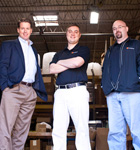On Fridays at 4 p.m., you might catch employees of ad agency Grady Britton on the rooftop sipping themed cocktails and talking anything but shop. And on any given day, you’re bound to see staffers zipping around the office on old-school Razor Scooters, to blow off steam or simply reach the printer. Every once in a while they call a staff-wide “scoot-up,” for the 22 employees to ride around the floor the firm occupies in a converted warehouse. This sort of camaraderie and freedom makes the Portland, Oregon, full-service agency sing creativity.

Paige McCarthy, president and owner, says forming a company culture runs deeper than checking off a to-do list. “You set the tone for the type of environment you value working in every day, and you hire people who gravitate in that direction,” says McCarthy. “Then the culture actually creates itself.” Co-owner Andy Askren, executive creative director, points out that those at the top aren’t the sole influencers. “We have to be the stewards of the culture and keep an eye on it, but part of our job is encouraging others to respect it and become owners of it as well,” Askren says.
McCarthy joined Grady Britton in 1998 after working in several small agencies, from high-tech to consumer packaged goods. Askren came in 2002, hailing from large agencies in Los Angeles, New York, Chicago, and St. Louis. In 2009, they assumed ownership as Frank Grady, who founded the firm in 1974, phased out. McCarthy and Askren’s business partnership is a creative “marriage” that feeds off each other’s ideas and state of mind. Such generative energy sparks the high-power brand strategy, creative problem solving, and inspired work they execute for clients. It also radiates to employees.
What-if” sessions are the portals for great ideas at Grady Britton. In them, staffers pose clients’ problems and brainstorm solutions—capturing notes on floor-to-ceiling glass walls. “You can say it’s just advertising, but to us it’s much more,” Askren says. “Our goal is always to make messages connect, make a difference, cause a shift in perception, change in behavior—all with a focus of meeting a specific business objective.”
As leaders, McCarthy and Askren empower their team to stretch their boundaries, learn, and excel. Each person is allotted a $500 professional-development allowance, with the caveat that the student must later share insights with the agency in a formal presentation. When it comes to billable work, employees are given ample space to drive projects forward. A job well done might earn a bottle of wine, a weekend getaway, or a $1,000 bonus from management. Employees give one another kudos via notes dropped in a kitchen box, which are read aloud at Monday meetings.
During a brand refresh of their own seven years ago, the agency developed a signature mark: the griffin, a mythological half-eagle, half-lion creature. “We loved what it stood for—honor, valor, integrity, and strength,” McCarthy says. Griffins are everywhere in their space, including a heavy pub sign from England bearing an oversize red griffin with claws extended. Capturing the essence of Grady Britton¸ the griffin has become an internal standard. “If you do a something above and beyond, really contribute, we say: That was really Griffin-y,” McCarthy adds.
For the past five years, Grady Britton has ranked on a list of Oregon’s Best 100 Companies to work for. It remained on the list in 2008, when several clients slashed spending and, consequently, the agency’s budget. McCarthy and Askren were challenged to reduce 30 percent of overhead. After consulting with their three directors, the consensus was that rather than lose any valued team members, everyone would take a 20 percent pay cut. The staff accepted without hesitation. “That’s what told me that people were really believing in this as more than a job,” McCarthy recalls. (The reduction ended up rounding out to 10 percent of each employee’s salary, thanks to an emergency fund Grady Britton had arranged with the state government in bountiful times. By 2010, pay returned to normal.)
Now, when clients experience brand ailments, the agency probes them to look internally. “Culture is a great barometer of whether the work you’re doing is as great as it should be or if it’s off somehow,” Askren says. For Grady Britton, a vibrant culture starts with hiring the right people and inspiring them to “nail their job” in everything they do. It’s the collective rising to the challenge, Askren says, that gives this agency its “special sauce.”


